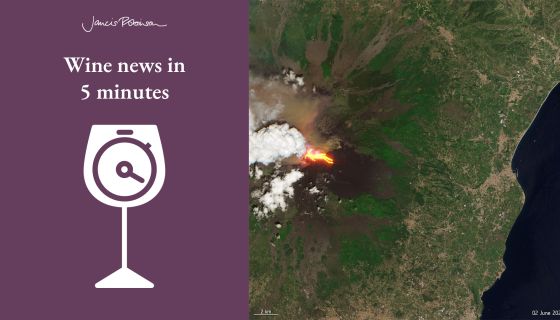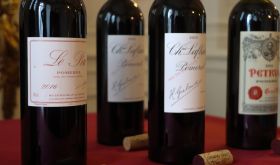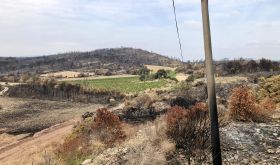Before I dive into global news, I want to wish Master of Wine students who took their exams this week the best of luck! Stage one students sat their exams on Monday and stage two students sat Tuesday through Friday. I deferred my exam this year but look forward to sitting in June 2026. Until then, I have my fingers crossed that my fellow students hear good news in September!
In regard to last week’s ruling by the US Court of International Trade that the Trump administration had overstepped their authority by issuing blanket tariffs, immediately followed by the US Court of Appeals pausing a lift on those tariffs, the only news I have is that the Liberty Justice Center was due to respond to the appeals court yesterday and that the Trump Administration is due to respond on the 9th. Perhaps we’ll know more next week.
Today we’ll discuss Mt Etna’s recent eruption, the US’s second-largest wine-and-spirits distributor exiting California, a slight reform in Sweden’s alcohol monopoly, and Vinarchy – the company that married the wine assets of Accolade and Pernod Ricard, announcing closures and investments.
Mt Etna erupts
On Monday 2 June, Mt Etna caused a stir by shooting huge plumes of ash into the sky. Videos circulated on social media with captions like, ‘Tourists run for their lives when Mt Etna suddenly erupts’. But, like with many things on the internet, you’d be wise to exercise a certain amount of scepticism. The eruption on Monday was nothing out of the ordinary with Bill McGuire, professor emeritus of geophysical and climate hazards at University College London, telling The Independent, ‘Although this can appear terrifying to tourists visiting the volcano, this activity is nothing unusual for Mount Etna …’ Nicola Purrello of Etna Urban Winery told The Drinks Business, ‘We are quite surprised at the kind of international coverage this generated, it should not really be news.’ Wineries are in good shape, the vintage seems to be progressing decently, and you can read more about Etna in Tam’s recent article, Etna's eight old-vine lessons.
Major distributor RDNC exits California
Before I launch into this, the US has what is called a ‘three-tier system’ for alcohol. What that means is that alcoholic beverages sold in the United States must go from the producer to a wholesaler to a retailer. The consumer then buys from the retailer.
While it is notable that domestic wineries have been able to sell directly to consumers in many states since 2005, the long and the short of this arrangement is that if producers want their wines in stores, it’s usually necessary to have a distributor. Distributors come in all sizes – some represent a dozen producers in only one state, some represent thousands of producers across dozens of states.
This week the second-largest distributor in the United States, Republic National Distributing Company or RNDC, accounting for a 16.9% share of the US wholesale market, announced that it would no longer do business in California as of 2 September. California is the largest consumer of alcohol in the United States.
Why is RNDC pulling out?
Most news sources speculate that it’s because RNDC has lost many of their top-selling brands to other distributors. Tito’s Vodka, Gallo’s High Noon and the Brown-Forman portfolio have all moved their products from RNDC to Reyes Beverage Group. Bob Hendrickson, president and CEO of RNDC, claimed in a statement on 5 June, ‘This decision was driven by rising operational costs, industry headwinds, and supplier changes that made the market unsustainable.’
What does this mean for producers, consumers and employees?
This means that hundreds, if not thousands, of domestic and international producers who are currently represented by RNDC in California will be scrambling to try to find a new distributor so that they can stay on shelves. Because of a shrinking market, most wholesalers aren’t looking to represent new wineries right now. Obviously, this sucks for producers but it also sucks for drinkers. If you live in California, I’d check and see if any of your favourite wine brands are distributed by RNDC. If they are, stock up. There’s no guarantee that brands will find new distributors by September. This also means layoffs. While nobody is quite clear on how many jobs will be cut, RNDC employs more than 14,000 people – so it’s likely to be in the hundreds.
Sweden allows cellar-door sales
On the subject of how alcohol systems are structured: Sweden is one of a handful of countries in the world that utilise a state-owned monopoly – all retail sales of alcoholic beverages in Sweden must go through this company, which is called Systembolaget. But as of this past Sunday, 1 June, The Drinks Business reports that the Swedish government is allowing Swedish distilleries, breweries and vineyards to sell direct to consumer, provided that the consumer first takes a paid tour. After the tour, customers will be permitted to buy one 0.7-litre bottle from a distillery or up to 3 litres of beer or wine per person.
This might seem slightly ridiculous to those of us who are able to walk into a winery and buy a hundred cases of wine but it’s the first time that Swedish producers have been allowed to sell directly to consumers in nearly a century.
Vinarchy announces closures and investments
Just over a month ago, on 30 April, Australian Wine Holdco, who owned Accolade, bought the wine assets of Pernod Ricard, merged the companies and rebranded as Vinarchy. On 3 June the company announced that it will close the cellar door and restaurant for Australian wine brands Rolf Binder and Banrock Station; that winemaking for St Hallett and Hardy’s Tintara will be moved to the Rowland Flat production facility in the Barossa, which will see an investment of AU$30 million; and that AU$70 million has been invested into the Berri Estates facility in the Riverland, which ‘will become Vinarchy’s primary commercial winemaking, packaging, and warehousing hub’.
I’ve seen a few articles lamenting the closures of the Rolf Binder and Banrock Station cellar doors and, while I agree it’s not ideal, investing AU$100 million (around $65 million, or £48 million) into a struggling industry to consolidate assets and increase efficiencies right from the jump seems a positive move. I hope, for the sake of growers and employees, that this works in their favour.
That’s all for this episode of the wine news. If you enjoy this newscast and would like to see it continue, please subscribe to JancisRobinson.com. And if you have breaking news in your area, please email news@jancisrobinson.com.
This is a transcript of our weekly five-minute news broadcast, which you can watch below. You can also listen to it on The Wine News in 5 Podcast. If you enjoy this content and would like to see more like it, please subscribe to our site and our weekly newsletter.














